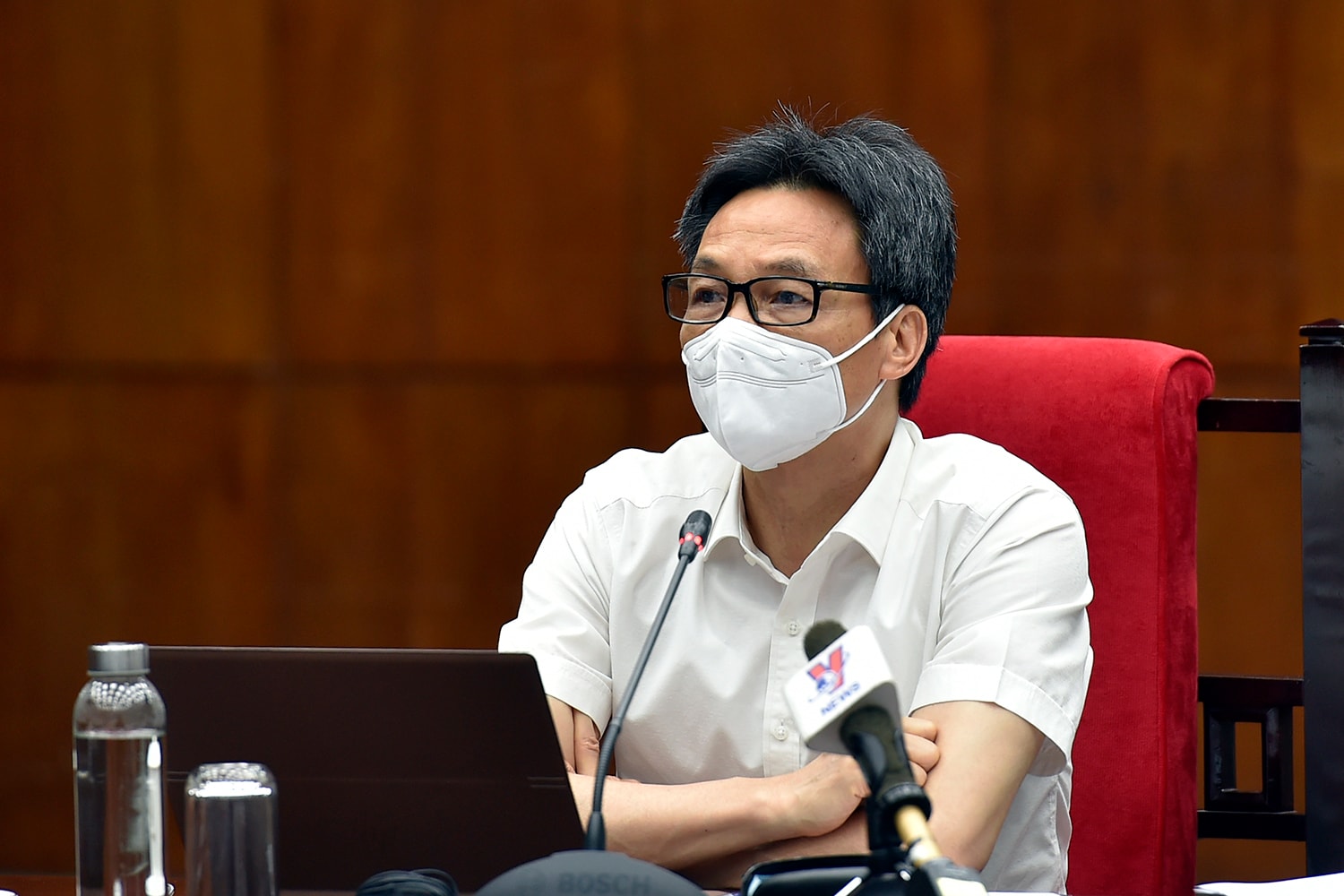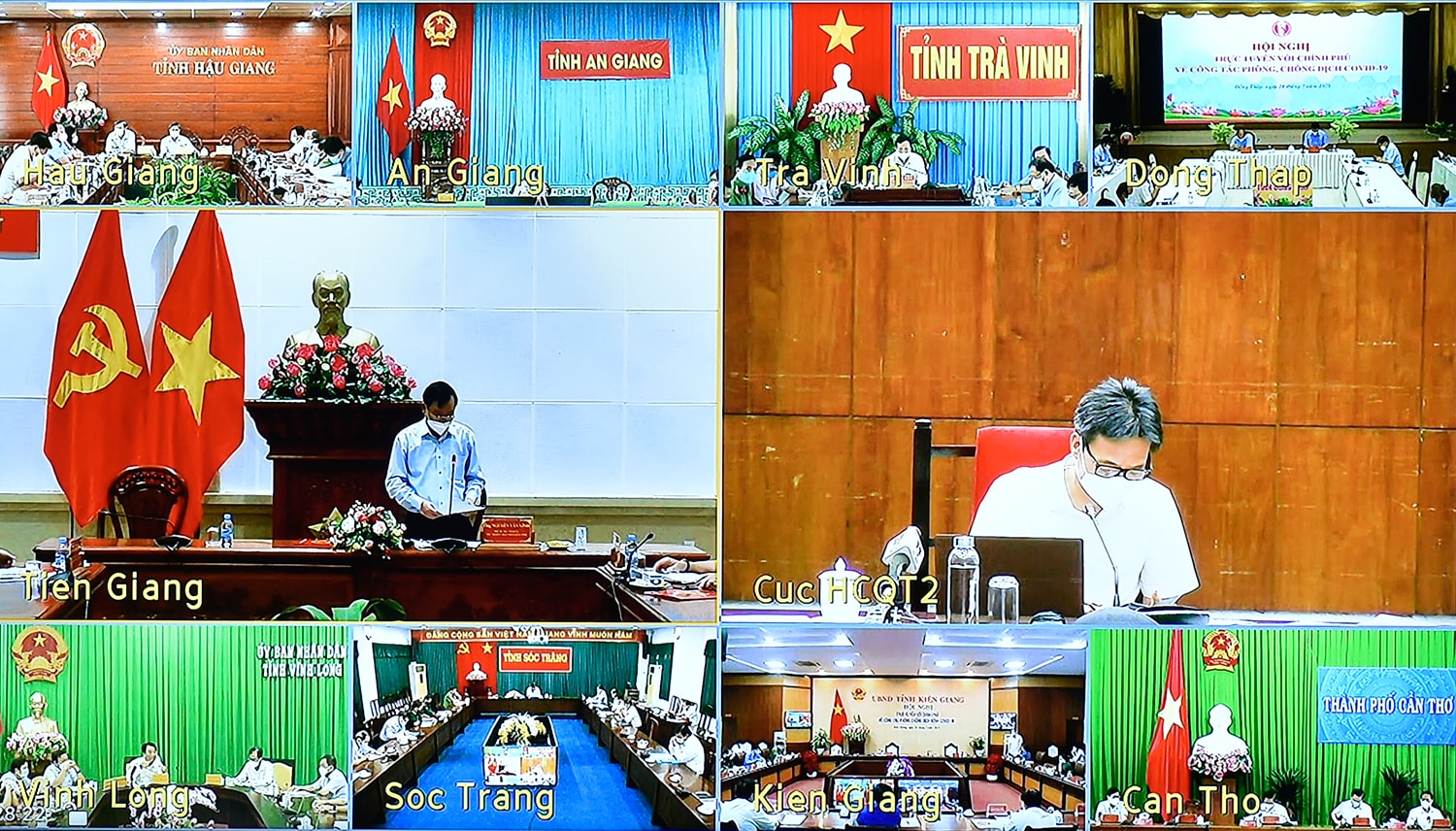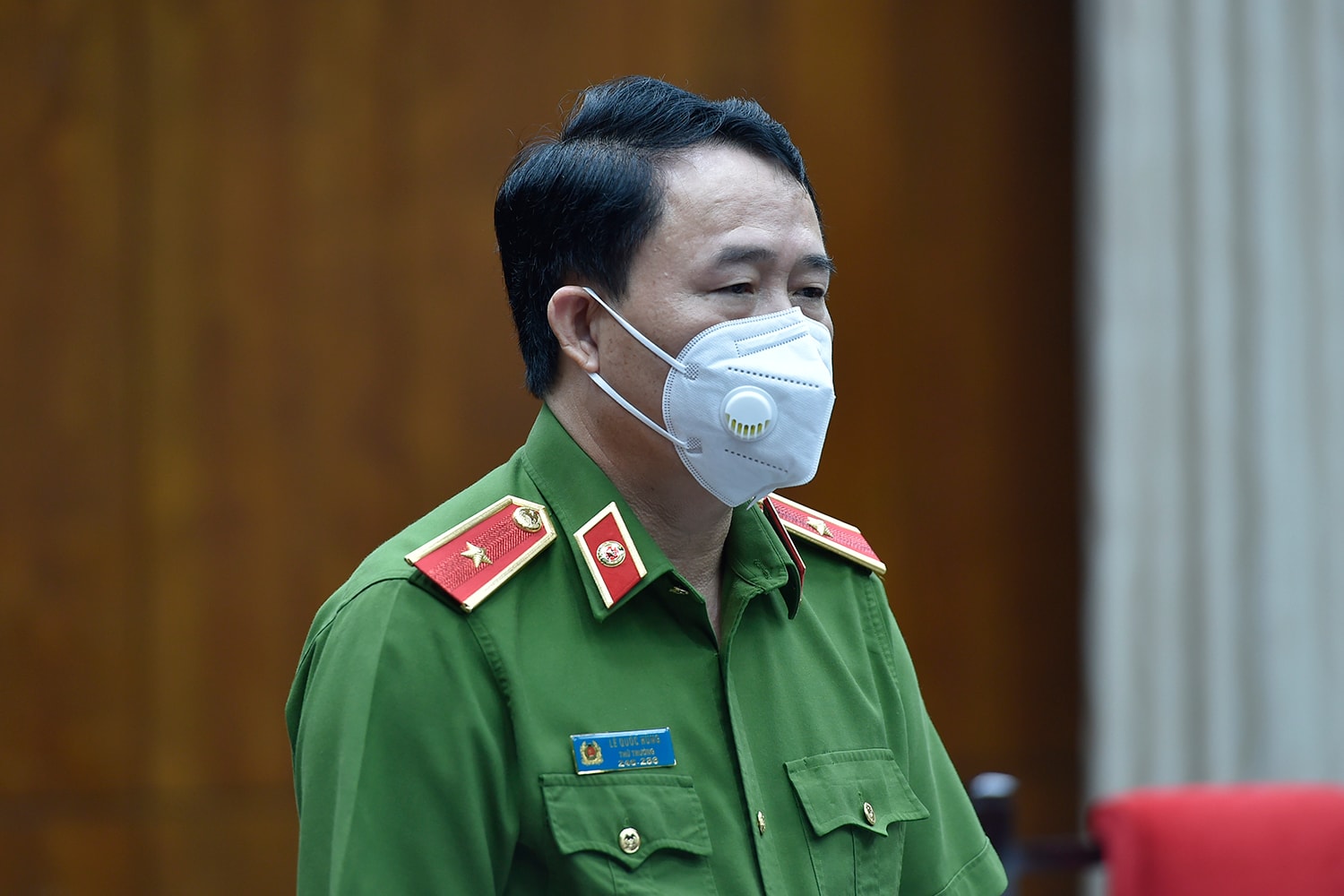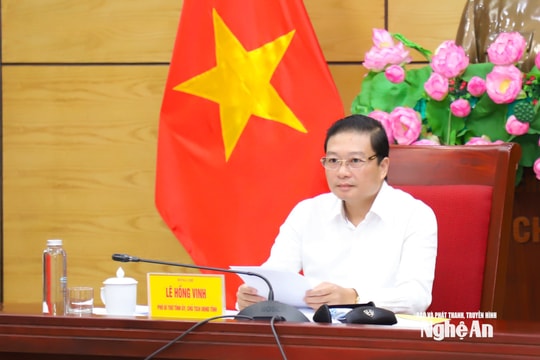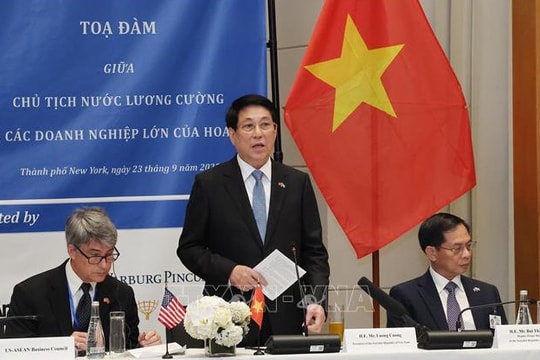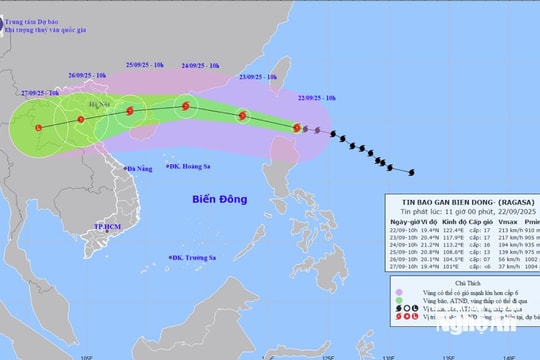Many provinces propose to extend the implementation time of Directive 16
Deputy Prime Minister Vu Duc Dam, Head of the National Steering Committee for Covid-19 Prevention and Control, the Government's Special Task Force on Covid-19 Prevention and Control, held a quick online meeting with 19 southern provinces and cities after 10 days of social distancing according to Directive 16/CT-TTg.
No need to add any more text
|
| Deputy Prime Minister Vu Duc Dam: Attention should be paid to the ability to organize and implement epidemic prevention and control measures at all levels, especially at the grassroots level. Photo: VGP/Dinh Nam |
At the meeting on the afternoon of July 28, leaders of provinces and cities said that they have implemented many measures, taking advantage of the social distancing period according to Directive 16 to focus on tracing and testing forces to quickly control outbreaks and control the situation. However, many localities expressed concern that the epidemic continues to be complicated, with more infections recorded, and some new outbreaks appearing when testing and screening have been increased in recent days.
Along with that, the provinces and cities in the Southwest region are under great pressure from the risk of disease intrusion when tens of thousands of workers, students and pupils return from epidemic areas.
Therefore, many provinces proposed to continue extending the implementation period of Directive 16.
Senior Lieutenant General Vo Minh Luong, Deputy Minister of National Defense, Head of the Government's Special Task Force on Covid-19 Prevention and Control, assessed that the epidemic situation in Ho Chi Minh City and the southern provinces and cities is still complicated but not unsolvable, provided that people strictly comply with Directive 16 and implement 5K well. In the past, Ho Chi Minh City has proposed many good solutions, but the implementation process in some districts has not been thorough and effective. Forces must strengthen inspection and control more seriously and strictly on people's movement during the social distancing period.
"HCMC does not need any more advanced documents, but based on the proposed solutions to take action and handle the situation more thoroughly, HCMC's epidemic prevention and control activities will be more effective," Senior Lieutenant General Vo Minh Luong said.
Major General Le Quoc Hung, Deputy Minister of Public Security, said that he has directed the police of all provinces to simultaneously implement many solutions to limit people from leaving their homes, increase patrols, control, and strictly handle violations; coordinate with the Ministry of Transport to deploy QR codes and green lane identification sets to facilitate the circulation of goods; strictly manage vehicles and drivers at points of delivery and receipt of goods.
The epidemic control time is longer than expected.
Deputy Prime Minister Vu Duc Dam said that after 10 days of implementing social distancing according to Directive 16/CT-TTg, 19 provinces and cities in the southern region, especially Ho Chi Minh City, have carried out a huge amount of work, which has been very supported by the people. However, the epidemic situation to this day is still very complicated. The epidemic prevention and control work in some localities in the south of Hau River, Binh Phuoc, Ba Ria-Vung Tau has been put into order, implemented very strictly in every corner, but the number of infections has not decreased significantly.
For Ho Chi Minh City, parts of Dong Nai, Binh Phuoc, Long An provinces, the epidemic has spread very widely and deeply. To completely contain the epidemic in this area, the time will be longer than expected, even in months. The situation in this area is different from many localities implementing Directive 16 and other localities across the country. Therefore, recently, ministries, branches, and the Government's Special Working Group have come to work here; went to the grassroots, learned, discussed and agreed with the City on many solutions to adjust to the new situation in Ho Chi Minh City. These solutions also apply to neighboring areas such as parts of Long An, Dong Nai and Binh Duong provinces.
The goal of the whole country in general, and 19 provinces and cities in the southern region in particular, is to prevent the epidemic from spreading and reduce F0 cases. Along with the goal of reducing F0 cases, Ho Chi Minh City and parts of Long An, Dong Nai and Binh Duong provinces must also carry out the most urgent goal in the immediate period, which is to reduce the mortality rate and reduce the number of patients with severe progression.
Treatment facilities at different levels, from mild symptoms, moderate symptoms, severe symptoms, very severe symptoms, critical symptoms... must be strengthened with equipment and human resources. Each level needs to do a good job of reducing the rate of people being treated for more severe cases. The Deputy Prime Minister gave an example, asymptomatic F0 cases need to be well taken care of both physically and mentally to minimize the rate of becoming symptomatic. In fact, there are places that do well, this rate is below 5% and there are places around 20-30%.
“The Covid-19 enemy is right at the door”
|
| Epidemic prevention and control work in some localities south of Hau River, Binh Phuoc, Ba Ria-Vung Tau has been put into order. Photo: VGP/Dinh Nam |
According to the Deputy Prime Minister, the policies and guidelines of the Central and local governments are correct and strong enough, however, attention should be paid to the ability to organize implementation at all levels, especially at the lower levels.
"It is not enough to just talk about the grassroots level, communes and wards. Now we have to talk about each neighborhood, even each residential area... to strictly and thoroughly implement the social distancing target according to Directive 16. That is the most fundamental solution. Only by strictly social distancing can we slow down the spread of the disease and cut off the chain of transmission," said the Deputy Prime Minister.
To do so, the Deputy Prime Minister requested all localities to properly implement the motto of "going to every alley, knocking on every door, checking every subject", "stay where you are", absolutely not having family-to-family contact, and immediately reporting to local authorities any cases entering/exiting the area.
Sharing with the people of Ho Chi Minh City and many other places that have had to practice social distancing for a long time, facing many inconveniences and difficulties, the Deputy Prime Minister called: The more difficult the situation is, the more we must unite and try to strictly implement the regulations of the authorities and the instructions of the health sector. "The Covid-19 enemy is right at the door", if we do not strictly implement, we and our loved ones will be affected. When many people are affected, the whole neighborhood, ward, district, province, city is affected, the country is affected.
In addition, during the period of social distancing, localities must ensure the circulation and distribution of essential goods and have practical and effective support policies for each citizen. "Absolutely no one must lack the essential needs of life." Therefore, the Deputy Prime Minister requested to gradually reorganize the safe circulation of goods, without congestion for a long time.
Establish a community health surveillance system
|
| Major General Le Quoc Hung, Deputy Minister of Public Security: Provincial police have simultaneously implemented many solutions to limit people from leaving their homes. Photo: VGP/Dinh Nam |
Strictly implementing Directive 16, the Deputy Prime Minister requested people to stay at home and only go out when absolutely necessary. In the context of the epidemic having penetrated deeply into the community, it requires a system of monitoring and managing public health, operating smoothly. In particular, local authorities, with the core being the health sector, are assigned to monitor and manage the health of each family cluster and each at-risk group so that anyone showing symptoms of Covid-19 or other chronic diseases must receive timely medical support.
This must be done urgently, organized at many levels, possibly using communication means, switchboards or organizing a network of remote health consultants, most directly in the area are organizations that monitor and manage the health of residents in the field.
The Deputy Prime Minister agreed with the leaders of Ho Chi Minh City on organizing, implementing and completing this task as soon as possible to ensure that people are managed and provided with timely health care.
The Deputy Prime Minister noted that in normal times, many places in the health system are overloaded, so it is necessary to ensure care and treatment for other patients, while also dividing Covid-19 treatment into many layers and layers.
At this time, we must create the most favorable conditions and provide timely encouragement to medical staff, doctors and other forces on the front lines.
Visiting many F0 collection areas and field hospitals treating Covid-19 patients, Deputy Prime Minister Vu Duc Dam said he was very moved when doctors and nurses always put people's health first; at the same time, he hoped that everyone would practice social distancing, "stay at home so they can return home soon and see their loved ones again".
Organize to welcome people back from epidemic areas
At the meeting, leaders of many provinces and cities said they had plans to coordinate with Ho Chi Minh City and Binh Duong to create favorable conditions to welcome people back to their hometowns after testing negative for Covid-19; prepare centralized quarantine areas...
Leaders of the Ministry of National Defense and the Ministry of Labor, Invalids and Social Affairs requested that provinces and cities closely coordinate and organize the safe return of people from Ho Chi Minh City, Binh Duong, and Dong Nai.
According to the Deputy Prime Minister, in reality, when the epidemic in other countries is getting more intense, Vietnamese people in these countries want to return home. Similarly, many people working in localities with deep and severe epidemics (such as Ho Chi Minh City, Binh Duong, Dong Nai, Long An) want to return home because factories are not yet operating. This is a completely legitimate need and we must have the responsibility to coordinate closely with each other, have detailed and specific plans, very careful preparation and organize to bring people home carefully and absolutely safely.
Through the mechanism of the Fatherland Front, the government, the Association of Fellow Countrymen..., provinces and cities should step up propaganda to encourage people to comply with the requirements of epidemic prevention and control of the local government where they live; at the same time, organize registration and public announcements so that people know, absolutely not allowing the situation where, due to the inability to organize, people have to violate regulations to find a way to return to their hometown.

